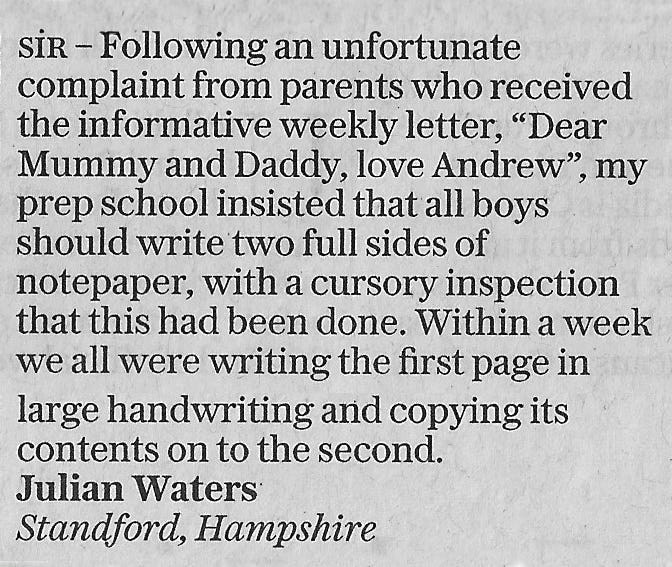126. ✒️ A letter to Terry: reply #24-03
Letters, being lost, and can bacteria really deal with our pothole problem?
This is the latest letter in my regular, informal correspondence with Substacker and fellow Brit
, in which we take turns every other Wednesday to delve into the things that British people talk about the most. So that you can explore these unashamed clichés for yourself we’re inviting you to read our letters over our shoulders.My next ‘Dear Reader, I’m lost’ post will of course be published on Saturday.
Dear Terry,
Many thanks for your latest letter, which as usual I thoroughly enjoyed.
Our letters are definitely letters, aren’t they? A silly question, perhaps, but I regard them just the same as a handwritten letter sent by snail mail, just with a more efficient delivery time, and although of course I can’t forget the fact that our collective cohort of 60,0001 subscribers are reading them over our shoulders, they’re certainly letters.
So when are letters not letters? I was intrigued to read Shaun Usher’s recent post to ‘Letters of Note’ in which selected letters from Katherine Mansfield to an assortment of recipients were openly described by the sender as ‘not letters’.
This example of ‘not a letter’ – written by Mansfield to Dorothy Brett on 14th November 1921 – indicates perhaps the transactional nature of correspondence.
This is not a letter. Now you owe me one—pleasant thought.
Katherine Mansfield
Ah, the letter-writing conundrum is a tricky path to follow. As we both know, I only write letters to you, Terry, so that I’ll get one back. 😉
Speaking of paths to follow, I greatly enjoyed getting lost in the map of London which you’d used to illustrate your post. I say ‘illustrate’ because as a card-carrying disorient entirely unable to use one of the pesky papery things for their designated purpose I regard them only as artworks.
As I had indicated in the comments thread at the time of first reading your letter I had at first misread the word ‘plaque’ as ‘plague’.
“I thought you might like to view a map of London and a list of the iconic locations that will, surely, have a blue plaque erected to show that I had visited or had some other connection to the place.”
Needless to say, my misinterpretation of your (admittedly correct) choice of vocabulary had sent me straight to the news app on my phone to read the reports I expected to find of ‘blue plague’ being spread across the capital by a reckless writer of my own acquaintance.
Mindful of those who are reading this letter over our shoulders, Terry, I am providing a link to the section about blue plaques on the website of English Heritage for anyone who would like to learn more about them. For now I have been unable to find any information about blue plague, and trust that our readers will excuse me on that point.
‘Solopreneur’ is a word I hadn’t ever heard of until you pointed it out to me as your least-favourite portmanteau word. You’re right, it does no justice to such an elegant title, constructed by the French from ‘porter’ (to carry) and ‘le manteau’ (coat) to form ‘portmanteau’ (the thing in which coats are carried). It’s ironic, though, that despite the addition of that Gallicism to English, the Académie Française resists the influx of the ‘impurities’ of language into its own dictionary, first complaining at the term ‘le week-end’2 when it was introduced to everyday parlance in 1926, and then again almost certainly every weekend since. 😉

In your letter you reminded me how much you’re enjoying Austen, and asked me what I’m reading at the moment. Well, I’m enjoying A Spool of Blue Thread by US author Anne Tyler, after having listened to a review of another of her books, Dinner at the Homesick Restaurant, on BBC Radio 4’s A Good Read recently. I’m only around a quarter of the way through Spool, but so far, so good!
In other news I have read the first three chapters of the beautiful edition of Emma which I’d been given for Christmas, and although I feel I should be making my own notes in order to keep track of all the characters I’m being introduced to – Terry, they’re coming thick and fast – I’m enjoying it so far.
I was glad to read in the news last week about the lower cost of tea to the consumer all of a sudden, until I began to wonder whether this might be more of an indicator of floor sweepings being labelled as ‘tea’ than a true reflection on a reduction to the rate of inflation. I think with your preference for floor sweepings loose tea puts you at far more risk of imbibing infusions of cobwebs and pocket lint from the factory floor than I – a user of teabags – am. You see, the effort required for those folk at Tea HQ to make, fill and seal tea bags no doubt means that the good stuff is reserved for those, and all the dross gets chucked loose into a tin for Terry. (Hee hee.)
Given my ever-growing passion for the conservation of decent road surfaces I look out for news reports on local budgets for street repairs, damage to cars caused by driving over potholes, and the latest statistics on Puddlegate (depth, span, cubic capacity, number of rubber ducks bobbing about, that kind of thing).
Well, it seems that now science is involved – and not in a terribly hygienic way, I’m sorry to say.
The headline shown above immediately brought to mind your alarming exploration of both gout and trench foot in a letter to me last year; two afflictions which, no doubt to the despair of any podiatrist or rheumatologist reading your words, you had felt sure were both related not only to the degeneration of our roads but also to each other.
As for BBC Science Focus Magazine’s claim that there are 750,000 potholes in the UK, well, that must be nonsense. I encounter at least that number3 on the regular commute to my job of casual labour – a trip of only eight miles. 😠
I demand a recount. And I’ll have no sprinkling of bacterial spores on them either, thanks – the outside world is unhygienic enough as it is. 🦠
Terry, this is another letter which I’ve really enjoyed writing. Looking back, as a child I would usually take much greater pleasure in playing with a new toy or getting started on a new book I’d been given for Christmas or my birthday than in writing letters of thanks to generous benefactors, but once I’d embarked on the task I would love it. I’d enquire after the health of the addressee, tell them my news, ask them for theirs, and let them know how much I was enjoying reading the latest addition to my Enid Blyton library or using my new paintbox, skipping rope or pastry cutters that I’d unwrapped. My letter-writing habit wasn’t restricted to just thank-you letters, either.
Yet it seems not everyone used to take pleasure in childhood letter-writing. I loved this letter to the editor published in The Telegraph on Saturday, October 28:
This, though, is a really special letter about letters, which had appeared in the same edition:
That’s right, Terry. Letters are priceless. Do you feel the same?
All the very best,
Rebecca
If you’ve enjoyed reading this letter to Terry, please let me know by clicking the heart. Thank you! My next ‘Dear Reader, I’m lost’ post will be published on Saturday.
You’ll find the rest of my letters in this series by clicking the ‘Letters to Terry’ tab on the top bar of my home page. Terry and I take it in turns to write to each other on alternate Wednesdays, and I really enjoy our light-hearted correspondence! You can access both Terry’s letters and mine using the index below:
Check out Terry's fabulous newsletter, and to make sure you don’t miss his reply to this letter next week, why not subscribe? You’ll be glad you did!
Last but not least, do please share and subscribe for free! Thank you!
Rebecca is prone to exaggeration.
French has borrowed a considerable part of its lexicon from English, and continues to do so today, though with some resistance from the Académie Française. The case of le weekend is well documented. Borrowed unchanged from English in 1926, le weekend was by no means the first French borrowing from English. The soaking up of English words into the French lexicon has been so pervasive that there is even a word - Franglais - for the mixture of French and English that results. The term was first coined by René Étiemble in his (1964) book Parlez-vous Franglais where he took a light-hearted look at the phenomenon. Since then, the matter has come under more serious scrutiny from an anxious government and a number of watchdog organisations who see the infiltration of English as a direct threat to the purity of the French language. In August 1994 French Minister for Culture, Jacques Toubon, put forward a law aimed at restricting the influx of English and reintroducing new words to replace anglicisms already in place in the language. Toubon was keen to introduce fines for people using the anglicism computer instead of the home-grown word ordinateur, for example. A government paper produced in 1996 aimed at inventing or reintroducing French words to replace the plethora of anglicisms in the fields of economics and finance specifically, gives a list of 70 replacements including: arbitragefor trade-off; la vente agressive for hard selling; jeune pousse for start-up and achat sur simulation électronique for virtual shopping. The author stresses that the main aim is to invent new French words for new phenomena soon enough to stamp out the wholesale adoption of the English term.
Taken from the Macmillan website.
Reminder: Rebecca is prone to exaggeration.










LOL at that reminder about Rebecca and her exaggeration tendencies 🤣
"I expected to find a ‘blue plague’ being spread across the capital by a reckless writer of my own acquaintance." Thank heaven, another catastrophe averted. Although I imagine a blue plague would not be as significant as a black one? And about those "self healing roads"? How stupid do they think we are? ( Very stupid.) And, regarding "Franglais", it is not something we hear about across here in the US, but we do have tons of speakers of "Spanglish". I hear code mixing all the time, things like, "Abre la window." and "Vamos a pushar el carro." ( Instead of Abre le ventana. and Vamos a empujar el carro.) Those finicky French are going to have to let it go. Nobody cares. It is a big world...